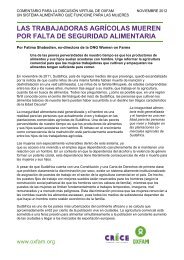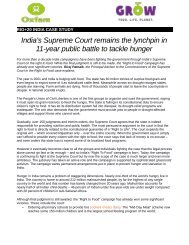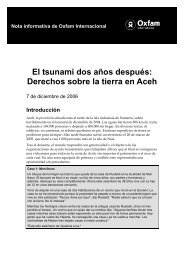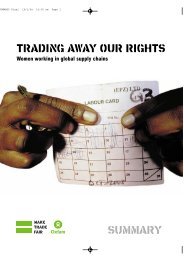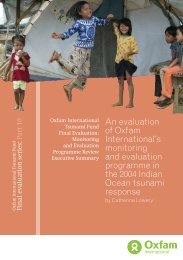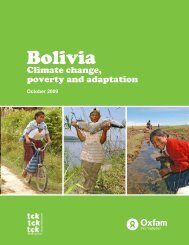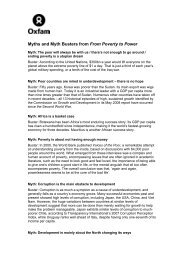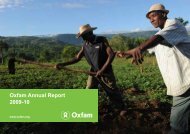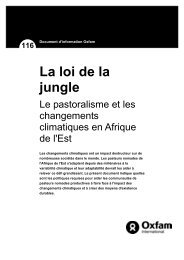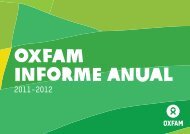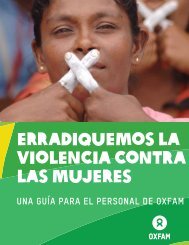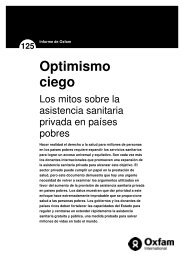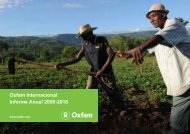Oxfam Strategic Plan, 2013-2019 - Oxfam International
Oxfam Strategic Plan, 2013-2019 - Oxfam International
Oxfam Strategic Plan, 2013-2019 - Oxfam International
Create successful ePaper yourself
Turn your PDF publications into a flip-book with our unique Google optimized e-Paper software.
THE POWER OF PEOPLE AGAINST POVERTY 7<br />
OXFAM STRATEGIC PLAN, <strong>2013</strong> – <strong>2019</strong><br />
The Power of People against<br />
Poverty<br />
Today 1 billion of the earth’s 7 billion women and men live in<br />
avoidable extreme poverty. Within a single generation, the<br />
earth will be inhabited by 9 billion people, and 90 per cent<br />
of the additional 2 billion inhabitants are likely to be born<br />
into poverty.<br />
The challenge of our generation is to find the ways to<br />
change those odds. How can we reduce extreme poverty,<br />
increase people’s rights, and balance the ecological<br />
systems that sustain life and the economic systems that<br />
sustain wealth? The answer is, simply, justice; fair use<br />
of the world’s natural resources; a global economy that<br />
reduces inequality; a world that does not discriminate<br />
against women or minorities.<br />
<strong>Oxfam</strong>’s contribution is to use an integrated approach,<br />
reducing poverty by addressing the causes of poverty,<br />
locally, nationally and globally. <strong>Oxfam</strong> works at the most<br />
fundamental level to save lives in humanitarian crises,<br />
and at the grass-roots level to promote development;<br />
and, simultaneously, we link local action with crucial<br />
campaigning that draws on our advocacy in support of<br />
policies and practice that underpin justice and well-being.<br />
We couldn’t do either well without the other, and it is<br />
weaving together this complex web of efforts and joining<br />
with others, in dialogue or in protest, that <strong>Oxfam</strong> has found<br />
to be effective.<br />
Increasingly the focus has shifted with the understanding<br />
that exclusion, inequality and injustice are the real target,<br />
more than simply a lack of income. The most effective<br />
solutions lie in people demanding their rights to livelihoods<br />
and decent work, and working together to increase<br />
living standards and reduce vulnerability. <strong>Oxfam</strong> works to<br />
enable people to become fully integrated and respected<br />
members of their society and economy. We do this by<br />
working with communities, lobbying for change by national<br />
governments, or campaigning globally to change the way<br />
the policies of rich countries create or perpetuate the<br />
injustice of poverty.<br />
There are some recurring priorities that underpin all our<br />
local-to-global work.<br />
In all <strong>Oxfam</strong>’s programming, campaigning and humanitarian<br />
relief efforts, we support people to claim and exercise<br />
their basic rights, to life and security, a sustainable<br />
livelihood, and the most essential services to sustain life<br />
such as health and education. The right to be heard and<br />
to have a recognized identity are also a fundamental part<br />
of human well-being. These rights are explicitly grounded<br />
in the Universal Declaration of Human Rights of the United<br />
Nations, and the relevant Treaties and Covenants.<br />
In the coming years, we will continue to place a high<br />
priority on supporting women at all levels to become<br />
leaders and take valued roles in the society and economy.<br />
Women are proving their power to lead communities and<br />
businesses and thwart the violence and oppression that<br />
has kept them illiterate and exploited in many parts of the<br />
world.<br />
Equally, campaigning to arrest runaway climate change<br />
is part of our effort to prevent natural disasters and<br />
adapt to environmental conditions. We want to ensure<br />
that poor countries do not pay the price for the historical<br />
responsibility of the polluting rich world which has enjoyed<br />
unrestricted carbon-based development. This underpins<br />
our work on sustainable development and food; our<br />
advocacy for more equality between parts of the world<br />
and within countries; a belief that fairer sharing of scarce<br />
natural resources is vital for the future of the planet and<br />
humanity.<br />
These approaches form the basis for the <strong>Strategic</strong> <strong>Plan</strong>.<br />
Fortunately, there are grounds for optimism.<br />
Within the last two decades, 660 million people have<br />
risen out of poverty. Average real incomes in developing<br />
countries have doubled and the world’s average life<br />
expectancy has increased by four years. We are developing<br />
the understanding of what is needed to reduce poverty in<br />
varied and complex circumstances.<br />
Investment in small-scale farming, particularly women<br />
farmers, can make big inroads on poverty. There is much to<br />
learn from the experiences of large-scale poverty reduction<br />
in East Asia. Brazil has demonstrated that effective tax<br />
systems to finance good quality public services, such as<br />
health and education, can reduce poverty and inequality.<br />
There are also increasing numbers of governments that<br />
prove the importance of effective states, without which it<br />
is impossible to tackle poverty. Some developing country<br />
governments are establishing social safety nets to protect<br />
their most vulnerable and excluded citizens – a vital<br />
measure to address inequality and fairness.



